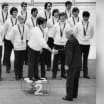Among those joining Ovechkin in the conversation as the greatest Russia-born player, none were nearly as durable.
Fedorov may have been the best from Russia before Ovechkin, but his game was completely different. Ovechkin is a high-volume shooter who scores at an accelerated rate and Fedorov was an all-around player. He scored 50 goals once (56 in 1993-94) and had 100 points twice in his NHL career, but won the Selke Award (top defensive forward) twice and finished in the top four three more times.
From 1992-93 to 1996-97, Fedorov may have been the best two-way forward in hockey. He won the Hart Trophy (MVP), Lester B. Pearson Award (most outstanding player chosen by the NHL Players' Association, now the Ted Lindsay Award) and Selke Trophy in 1993-94. He won the Stanley Cup three times with the Detroit Red Wings (1997, 1998, 2002) and had 176 points (52 goals, 124 assists) in 183 Stanley Cup Playoff games. Ovechkin has 117 (61 goals, 56 assists) points in 121 postseason games.
There are other elite scorers from Russia in the conversation.
Pittsburgh Penguins center Evgeni Malkin has 985 points (384 goals, 601 assists) in 834 NHL games. His 1.18 points per game is third among active players behind Sidney Crosby (1.29) and Connor McDavid (1.28), but ahead of Ovechkin (1.12).
Malkin has won the Stanley Cup three times, the Art Ross Trophy (given to the player who leads the NHL in points) twice and one Hart Trophy. Malkin has played 220 less games despite arriving in the NHL the season after Ovechkin (2006-07).
Ilya Kovalchuk is an Ovechkin contemporary who was a premier goal-scorer and a decade ago might have been considered a challenger as the best Russia-born player. Kovalchuk, now with the Los Angeles Kings, spent five years in the Kontinental Hockey League and that absence depressed his NHL numbers. He has 839 points (427 goals, 412 assists) in 857 games but has never won the Cup and reached the Final once with the New Jersey Devils in 2012.


















